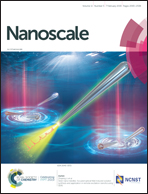An N-doped porous carbon network with a multidirectional structure as a highly efficient metal-free catalyst for the oxygen reduction reaction†
Abstract
Metal-free catalysts have gained substantial attention as a promising candidate to replace the expensive platinum (Pt) catalysts for the oxygen reduction reaction (ORR) which is a key process in low temperature fuel cells. Development of highly efficient and mass-producible N-doped carbon catalysts, however, remains to be a great challenge. In this study, N-doped porous carbon (NPC) materials were synthesized via a simple, cost-effective and scalable method for mass production by using the D-gluconic acid sodium salt, pyrrole, Triton X-100 and KOH. The resulting NPC possessed a multidirectional porous carbon network (SBET: 1026.6 m2 g−1, Vt: 1.046 cm3 g−1) with hierarchical porosity and plenty of graphitic N species (49.1%). Electrochemical tests showed that the NPC itself was highly active for the ORR under alkaline and acidic conditions via a four electron pathway for the complete reduction of O2 in water. More importantly, this NPC catalyst demonstrated better performance than commercial Pt/C catalysts in terms of long-term durability and methanol tolerance under both conditions.



 Please wait while we load your content...
Please wait while we load your content...